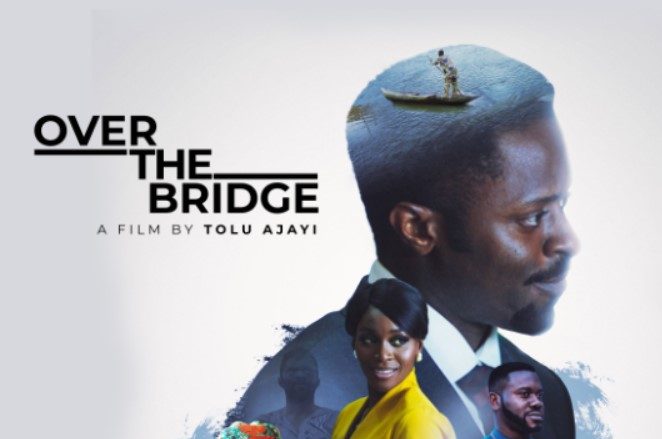Over the Bridge emerges as not just a critique of Nigeria’s systemic rot, but a meditation on emotional disintegration as mental health is positioned not as a narrative footnote, but as a core element in the story of ambition and success.
By Frank Njugi
Art, at its most incisive, is not only a mirror to society’s grand narratives, but also as a magnifying lens for the seemingly mundane. Those everyday silences, and compromises, that often go unnoticed yet carry the weight of social and existential significance. By rendering the familiar yet unspoken, art compels audiences to confront the vital truths embedded in the ordinary. It reveals how what is dismissed as trivial or normal can be the very thing that impacts a human life negatively.
Currently, in terms of film, Africa’s cinematic terrain is alive, and a new generation of artistic directors is reshaping visual storytelling. One of them is Tolu Ajayi.
Ajayi is a director hailed for acclaimed TV series such as Tinsel, Gidi Up, and MTV’s Shuga, as well as award-winning short films like The Encounter (2015). His feature debut is the 2023-released film, Over the Bridge, a psychological thriller which premiered at the New York African Film Festival and garnered 12 AMVCA nominations the following year.
In this debut feature, Tolu Ajayi navigates the interplay between the visible and the overlooked, drawing attention to the norms of daily life in his country, Nigeria, and how they lead to broader happenings at an individual level.
Over the Bridge tells the story of Folarin, played by Ozzy Agu, whose much-awaited dream project, a major infrastructure project in Lagos, Nigeria, is stalling, dogged by financial issues and scandals.

As days go by, while working to push this project forward, he finds himself navigating a maze of underhanded deals which operate at the margins of professional integrity. At the same time, he mentally grapples with the pressure of the unfortunate circumstances surrounding his young protégé, Kevin (portrayed by Chimezie Imo), whose involvement in the project results in his death.
One day, on his birthday, Folarin goes missing, and his wife Jumoke (portrayed by Segilola Ogidan) embarks on a frantic search for him. It turns out Folarin fell ‘ over a bridge’ as his car is discovered in one. Jumoke fears his death but in truth, Folarin has survived the fall but suffers from amnesia, and is rescued by a fisherman who nurses him back to health.
Back home, Jumoke suspects that Folarin’s mysterious disappearance is tied to the pressures surrounding the controversial project he was involved in. As she grapples with his absence—both emotionally and financially—Folarin struggles to piece together the fragments of his past.
Ozzy Agu’s command of language as Folarin, and exceptional dialogue delivery enhance the main character’s authenticity and also brings more into focus the film’s thematic depth, effectively articulating the film’s exploration of mental and psychological health.
Through Folarin’s journey in the film, Over the Bridge revisits the familiar Nollywood story of ambition and desire for upward mobility. But the film distinguishes itself by peeling back the glossy veneer to expose the effects of the ethical decay festering within Nigeria’s social world.
Over the Bridge becomes not just a critique of systemic rot, but a meditation on emotional disintegration as mental health is positioned not as a narrative footnote, but as a core element in the story of ambition and success.

The supporting characters to Folarin seem crafted to serve for the progression of his individual narrative and also advances the film’s underlying subtext. For example, Segilola Ogidan as Jumoke, cast as the bewildered wife of a man grappling with mental turmoil–becomes a vessel for exploring the unspoken frustrations of partners navigating crises they cannot fully comprehend, a choice that gives the film a powerful subtext of relational strain.
The only downside and maybe what might be the film’s only witnessed flaw, lies in its lack of substantially explained backstories—of both Folarin and these supporting characters. But this might be a choice that may well be intentional, as the narrative appears more invested in exploring the psyche of an individual at a specific period in time, than in constructing a fully fleshed-out, plot-driven arc.
This introspective focus is mirrored in the film’s visuals as well: KC Obiajulu’s cinematography is marked by refinement and precision, which is elevated by meticulously authentic wardrobe selections in each scene in the film. There is deliberate pacing of shots and scenes that don’t rush but linger just long enough to invite reflection into the main character’s (Folarin’s) inner world. A delight for any cinephile.
When memories of Folarin finally return, he reunites with Jumoke and the two begin a journey of atonement and redemption.
Tolu Ajayi’s debut has a greatness that lies in the way it mirrors the human tendency to find truth through story, as the film’s fiction becomes a safe space to confront an uncomfortable topic. Over the Bridge becomes an artistic beauty that softens the blow of harsh realities in a country, Nigeria, making a difficult theme feel both intimate and undeniable.
Further, the film uses a single individual’s story to offer itself as an exploration of the pervasive societal pressure to engage in corrupt practices, particularly the normalization of illegal kickback, that continues to undermine Nigeria’s development.
Ajayi’s film takes a look at how systemic corruption, reinforced by expectations and institutional complacency, compromises not only a nation’s progress but also the moral compass of individuals.

Through Folarin, it reveals how the external demand for unethical behavior infiltrates the psyche, gradually manifesting as an internal crisis marked by guilt, disillusionment, and deteriorating mental health. In this way, the film frames corruption not only as a socio-political issue but as a deeply personal and psychological struggle.
French-American essayist, Anaïs Nin, once observed that “great art is born of great terrors, great loneliness, great inhibitions, instabilities — and it always balances them”. This philosophy is prevalent in Tolu Ajayi’s Over the Bridge, as cinema is employed not merely as storytelling but as a critical mirror to the rot in Nigeria’s social society.
Through its narrative, the film in a fine way interrogates Nigeria’s social realities, exploring its psychological toll on individuals. In doing so, Ajayi affirms Nin’s assertion: art emerges not in spite of, but through, the fractures of instability, alienation, and existential anxiety. The result is a cinematic work that navigates dissonance to arrive at a compelling artistic equilibrium, where real-life disorder becomes the condition for artistic coherence.
Over the Bridge screens for the first time in Africa from 6th June at selected venues in Nairobi, Kenya.
Rating 3.5/5
Frank Njugi is an Award-winning Kenyan Writer, Culture journalist and Critic who has written on the East African and African culture scene for platforms such as Debunk Media, Republic Journal, Sinema Focus, Culture Africa, Drummr Africa, The Elephant, Wakilisha Africa, The Moveee, Africa in Dialogue, Afrocritik and others. He tweets as @franknjugi.




